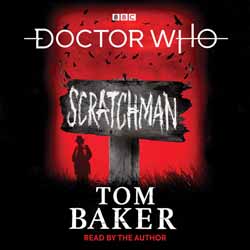|
Click here to return to the main site. Audio Book Review
The Doctor, Harry and Sarah Jane Smith arrive in a quiet Scottish village, but their holiday is cut short by the appearance of strange creatures – living scarecrows who terrify the local population. The scarecrows are the work of the sinister Scratchman, a cosmic force that enslaves planets and turns them into nightmare worlds – and he has set a series of traps for the Doctor, to get inside the Time Lord’s head. What is the Doctor most afraid of? If Scratchman can learn that, then no force in creation can stop him. The fate of the universe hangs in the balance. And the Doctor’s worst nightmares are coming out to play… Having novelised one unmade Fourth Doctor movie script, Doctor Who and the Krikkitmen, James Goss has helped Tom Baker with the other one. Doctor Who: Scratchman is based on an idea that was cooked up in the mid-1970s by Baker and his then co-star Ian Marter (alias Harry Sullivan). It’s unclear how much of a hand Goss had in this adaptation – though, as my esteemed colleague Danny Salter has argued in his review of the print edition, it may have been fairly minimal. Many of the continuity references, which include nods to the Doctor’s past and future incarnations, are probably the result of Goss’s influence. Certainly the future Doctors could not have been present in the original script. These references range from the subtle (such as the Time Lord’s dislike of burnt toast, which was mentioned in Ghost Light) to the downright blatant (you’ll know when you get to them). However, the bulk of the prose is very much in keeping with the deliciously dark humour of the actor’s autobiography Who on Earth is Tom Baker? and his Roald Dahl-esque children’s novel The Boy Who Kicked Pigs. Baker’s fascination with the macabre is clearly evident: stumps used for a game of rounders remind the Doctor of the fingers of a giant skeleton, while haphazard gravestones are likened to a gappy set of teeth. There are some excellent descriptions, both witty and grim, such as when a curmudgeonly shopkeeper addresses the Time Lord with a voice “sharp as mustard and just as strong. You could pickle herrings with it.” Trying in vain to charm her, the Doctor plugs “another bulb into [his] smile”. Many of the descriptions ascribe human sensibilities to inanimate objects: from a group of yew trees behind a wind-battered church, “huddled around the back for shelter,” to “a suicidally miserable carpet.” A surprising feature of the novel is the use of a frame narrative set in a Gallifreyan courtroom, where the Doctor defends his meddling activities by recounting the events of the main storyline. The very thought of this may send shivers down the spines of fans who loathed the courtroom sequences in The Trial of a Time Lord. Fortunately, whereas those intermissions had a tendency to be dull, repetitious, bitty and inconsequential, not to mention interrupting the flow of the story all too often, these cutaways are less frequent, more impactful and characteristically more offbeat – I mean, one of the Time Lords has the bizarre title of Zero Nun. Perhaps even more eyebrow-raising is the fact that the book has been written in the first person, from the Doctor’s point of view. This is in stark contrast to many Who novels, in which the hero is treated as an enigma, whose inner thought processes are rarely, if ever, glimpsed. Fear not, though, as the prose spends more time detailing the Doctor’s observations of the world(s) around him than it does examining the Doctor himself. Besides, Tom Baker and the first person just go together, and have done so for a very long time. Take, for example, the in-character linking narrations that he provided for the Genesis of the Daleks LP (“I stepped from the TARDIS on to a bleak planet…”) or the original Shada video (“I’ve always felt at home in museums. Giant Robot. Beat you, cock…”). This is because, to a large extent, the character Baker plays as the Fourth Doctor is that of Baker himself. Tom is the Doctor and the Doctor is Tom – which is where the audio book version of Scratchman really comes into its own. Here we have Baker reading an adventure that he wrote, featuring his iconic incarnation of the Time Lord. Baker’s distinctive tones don’t exactly lend themselves to impersonating his dear departed co-stars, Ian Marter and Elisabeth Sladen (who played Sarah Jane Smith), so he doesn’t really try to. Instead, their characters come across through the authentically written dialogue. Several other characters, including the villainous Scratchman (who might have been played by Vincent Price had the film actually been made), sound scarcely different to Baker’s usual voice. However, the actor does have a gift for playing old people, including old ladies, of which there are several in this story. Nicholas Briggs also lends a hand, providing the voices of some foes from the Doctor’s past. Such modern interventions aside, listening to the unabridged audio book of Doctor Who: Scratchman is like having the Fourth Doctor read a scary and funny, sinister and surreal, earthbound and otherworldly bedtime story to you – a bedtime story that lasts for nearly nine hours. What more could a fan ask for? So sit back and hear how the Doctor steps from the TARDIS on to a bleak island and finally gets to meet Scratchman. Who knows, maybe he’ll beat him, too… 9 Richard McGinlay Buy this item online
|
|---|

